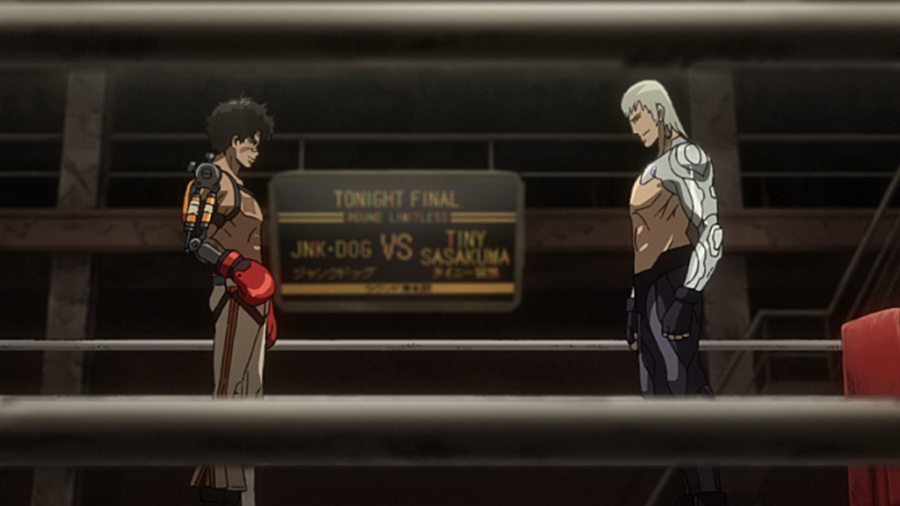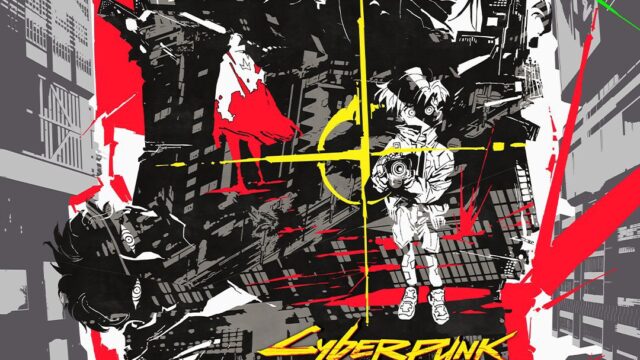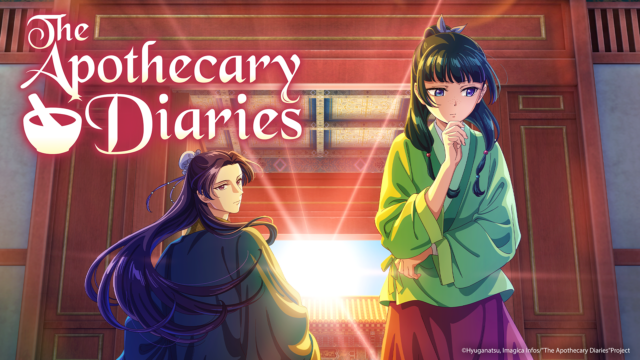Megalobox Interview: English Dub Producer Dave Casipit
Fresh off the finale of one of the best new anime series of 2019, we talk to producer Dave Casipit on what it took to adapt one of the most exciting sports anime in years.

John Schwarz: What do you look for in an ideal anime dub production?
Dave Casipit: First of all, my ideal dub finds the right balance between the creative intent of the original with what’s palatable to the target audience. I think a good dub walks a fine line where it’s trying to give you the charm or coolness or excitement of the original language but adds accessibility and polish. It should appeal to an audience that goes beyond anime to people who share an interest in the concepts, characters, and story of the original, even if they’ve never even seen an anime before. At the same time, a good dub always delivers on what hardcore anime fans want in terms of fidelity to the Japanese version and commitment to quality performances.
So I think a good dub accounts for elements that are part of the original language but are simply too foreign. For example, in Japanese communication, the context counts for so much. If we were simply to dub what’s in the Japanese script, there are times the Western audience might lose a lot of what’s going on underneath the surface. So a dub might help spell that out more.
Another element of a good dub—it adds polish where it can. Done right, localization can take things a step further than the original without being self-indulgent. Maybe it’s a turn of phrase, or interesting characterization, or adding in a bit of accent where there was only Japanese before. But it’s easy to get a big head and think, “I know how to make this great!” In his first audition, Jason Marnocha (Coach Nanbu) threw in an awesome New York accent, but since the show isn’t set in NYC it didn’t feel right to me. So I had him try without the accent and, voila! I can’t imagine a better voice for Coach Nanbu. But back when I did ONE-PUNCH MAN season 1, I figured why not give the sophisticated swordsman character Spring Mustachio a bit of a British accent? We had David Collins, the voice actor, try it on for size and it seemed to fit just right.
An adaptation that’s gone overboard runs the risk of turning off fans and angering the creators, so one must display good judgment when making these types of changes. But the payout can be good and add a dimension that’s lost to a subtitle-only audience. So my ideal dub adds the polish, but in tasteful ways.
Which brings me to my final point: any dub is naturally going to have the DNA of the adapters in it. There are simply too many variables and choices to be made—there’s no such thing as a truly “faithful” adaptation without a lot of input from creators, which just doesn’t happen in anime.
So ideally a dub displays good sensibility about these choices. I actually love hearing a character done in an interesting way by an actor or director that I wouldn’t have thought of. As long as it works within the lines painted by the original production, a cool bit of writing that the ADR scriptwriter has done, or when an actor or director brings out an aspect of the character that I hadn’t realized was there, makes my day. This allows us to pursue our work with a passion, and that passion results in good product. If we’re not laughing or crying in the recording booth, I doubt the audience will be doing either as well.
Megalobox seems like an easier show to adapt to a Western audience than, say, JoJo’s Bizarre Adventure. Do you find some shows more accessible to dubbing than others or do they all present unique challenges?
Yes, I think there are shows that are easier to adapt than others. Some of that is cultural—a show that requires heavy knowledge about Japanese culture on the audience’s part probably is going to be the heaviest lift. Humor is also very difficult to translate and usually requires the loosest adaption. On the other hand, shows that are centered around action can be the easiest to adapt for obvious reasons.
But I’d like to push back on MEGALOBOX being easier than other shows to adapt. The reason for this is that there is so much that is subtly going on under the hood of the show.
I can hear your readers now. “It’s a boxing show, Dave. Get over yourself.” No, I swear! Hear me out!
On the surface, it’s a fighting show and there’s plenty of time being taken up by easy-to-dub grunts and yells (well, easy for the producer and director—the voice actors definitely don’t want to yell all day!). But the majority of screen time isn’t scream time. It’s all about Team Nowhere, and also Yuri and Joe. And holy crap, do these characters all suck at communicating. During recording, I joked that the whole world of the show is populated with people who are repressing emotions and don’t want to talk about it. Yuri and Joe especially are “manly men,” laconic types whose physical presence and personality do a lot of their talking for them. But to be authentic, I wanted to hear the repression and emotions going on, even if they weren’t explicit.
So in the script phase, I had a lot of notes about their dialog. It would have made things more accessible to add in verbiage to illustrate what was going on in their heads, but that wouldn’t have been true to the characters or my vision for the show.
I ended up with lots of notes on the scripts about cutting down these two characters’ dialog. This would keep them terse, and also give the actors plenty of time to savor and play with their lines. These “men of few words” had to get the plot-relevant information across, but they also needed the lines and time to be “manly men.”
For example, one trick we use in ADR dub work in order to match the lip flap is that we will often run right through a period and go into the next line. Every good actor knows how to make that type of line sound passable. But for MEGALOBOX I didn’t want Joe and Yuri to have to rush through a period to make the lip flap work, because it sounds so much stronger to take your time speaking. True badasses don’t have to rush for anybody. They say what they mean and that’s it.
So for these two our ADR writer, Mike McFarland, had to deal with my silly notes about making each sound unrushed, terse, and strong, removing periods that were going to be ignored and fusing phrases down to the bare bones. Fortunately, Mike’s a true badass himself and got everything just right. He set the foundation for the characters to sound like the guys you want on your side, or maybe even the guy that guys want to be.
After the scripts were whittled down, Kaiji and Lex’s performances were everything. As I said, no true badass rushes through his thoughts as he speaks. He’s in complete control and knows it. I wanted to hear confidence, coolness, and masculinity behind every line. They delivered, but it wasn’t easy to get right!
Even harder was hitting the right emotional notes. Things are actually easier when everyone’s yelling, or when it’s good vs. evil. In MEGALOBOX, the emotions are much subtler. There’s no cackling villain or pure-hearted hero. Yuri’s stoicism could easily end up as bland, monotone boringness. Joe’s mad dog act could wind up over the top. “Here’s Joe, taking emotional punches through the series as often as physical ones. He struggles with dreams, loss, loyalty, and betrayal.” I wanted the audience to hear that it hurts and that he’s only just controlling the fury inside him, even if he’s decided he’s just going to do his job. That, in my opinion, is closer to the spirit of the anime than having him simply being an angry rebel all the time.
Nanbu, too, was a tough role. In a way, he’s actually the main character. He does most of the talking, he’s got the most interesting journey, and in the end, he’s the one who changes. Joe achieves everything but is pretty much still Joe; how about the old trickster Nanbu from episode 1? Is he still there in episode 13?
Jason Marnocha, who played Nanbu in our dub, had to find his way to making what was going on in Nanbu’s head in any given scene sound authentic, and Nanbu was so often caught between a rock and a hard place, between his head and his heart, and periods of self-doubt, self-love, and self-loathing. But of course, he never turns to the camera and says any of that, so it had to be present in the subtext, in the performance.
I think any craftsman can tell you that making something look simple and elegant is often the hardest project. I believe we did a good job, and it is my sincere hope that hardcore fans that give a really close listen to the dub will get a lot out of it.
How familiar were you with Megalobox, Ashita no Joe, or boxing anime in general before taking on this production?
Regretfully, I only knew the name Ashita no Joe and a bit of the storyline and its place in anime history. When I first took on the project, I watched MEGALOBOX several times and did some light editing of the subtitles so that they could be the basis of the dub scripts. Then I went back and found some episodes of Ashita no Joe to watch. But business is what it is and schedules have to be met, so I still haven’t watched the original series all the way through. Forgive me, anime gods…
As for boxing in general, I’m only a casual fan. I had to do a lot of research on some of the more technical aspects of boxing, especially the English terminology, to make sure things sounded as authentic as possible. I even watched old fights to see how they were called by the announcers. Luckily MEGALOBOX isn’t a real sport, so I was able to take a few more liberties than I would have had it been a pure boxing show.
Any standout or favorite moments to adapt from Megalobox?
Of course, Joe and Nanbu were the centers of my attention, but I was OBSESSED with getting Yuri right. The basis for my vision of him was Kyuzo from The Seven Samurai. A taciturn man, one who lives by the code of bushido, whose only goal in life is to perfect his mastery of the art of the sword. He strictly adheres to his code and is absorbed in his practice, while still living morally and humbly. That was Yuri for me. No hint of pompousness, not even any villainy. Just a man pursuing his dream single-mindedly. I felt the rivalry between Joe and Yuri would work best if the viewer ended up barely knowing which one to root for.

Then there was Sachio’s rap. I was actually scared to adapt it since I basically know nothing about how to make raps sound good. Luckily, I was able to bring in some good people from around VIZ to help me out and Erica Mendez performed it incredibly! I think she must have been practicing for weeks before the recording because she just walked in and nailed it. From the reactions on social media, the fans seemed to enjoy her performance too.
The other standout moment for me, though again I can’t take any credit, is Aragaki’s near-suicide moment. I let the director know that I thought it could easily end up sounding cheesy or overdone and wanted to treat that moment with respect. I expected we were going to have to do a lot of takes to get it right. Then, first take, the performance Greg Chun put in gave me goosebumps when we recorded it. I mean, it still does. Don’t tell Japan, but I think it sounds even better than the original Japanese!
Some questions contributed by Dave Kaldor. Read our review of Megalobox Season One here.

Megalobox Limited Edition Blu-ray + GWP


























"There are also other characters that come and go (also owned by the Warner Bros. Discovery conglomerate media company)."
Huh. Is that just referring to other characters from the show itself, or is this implying that the new season is going to have cameos from other WBD IPs